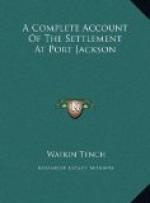On the first of May, many allotments of ground were parcelled out by the governor to convicts whose periods of transportation were expired, and who voluntarily offered to become settlers in the country. The terms on which they settled, and their progress in agriculture, will be hereafter set forth.
CHAPTER XIV.
Travelling Diaries in New South Wales.
From among my numerous travelling journals into the interior parts of the country, I select the following to present to the reader, as equally important in their object, and more amusing in their detail, than any other.
In April 1791 an expedition was undertaken, in order to ascertain whether or not the Hawkesbury and the Nepean, were the same river. With this view, we proposed to fall in a little above Richmond Hill*, and trace down to it; and if the weather should prove fine to cross at the ford, and go a short distance westward, then to repass the river and trace it upward until we should either arrive at some spot which we knew to be the Nepean, or should determine by its course that the Hawkesbury was a different stream.
[Look at the map for the situation of this place (Unfortunately, there is no map accompanying this etext. Ed.)]
Our party was strong and numerous. It consisted of twenty-one persons, viz. the governor, Mr. Collins and his servant, Mr. White, Mr. Dawes, the author, three gamekeepers, two sergeants, eight privates, and our friends Colbee and Boladeree. These two last were volunteers on the occasion, on being assured that we should not stay out many days and that we should carry plenty of provisions. Baneelon wished to go, but his wife would not permit it. Colbee on the other hand, would listen to no objections. He only stipulated (with great care and consideration) that, during his absence, his wife and child should remain at Sydney under our protection, and be supplied with provisions.
But before we set out, let me describe our equipment, and try to convey to those who have rolled along on turnpike roads only, an account of those preparations which are required in traversing the wilderness. Every man (the governor excepted) carried his own knapsack, which contained provisions for ten days. If to this be added a gun, a blanket, and a canteen, the weight will fall nothing short of forty pounds. Slung to the knapsack are the cooking kettle and the hatchet, with which the wood to kindle the nightly fire and build the nightly hut is to be cut down. Garbed to drag through morasses, tear through thickets, ford rivers and scale rocks, our autumnal heroes, who annually seek the hills in pursuit of grouse and black game, afford but an imperfect representation of the picture.




